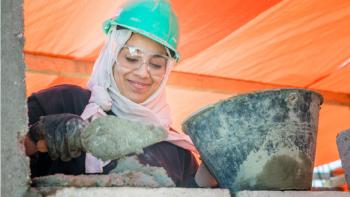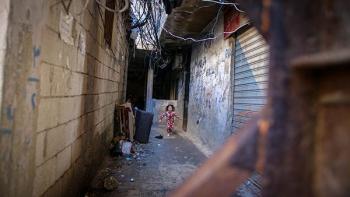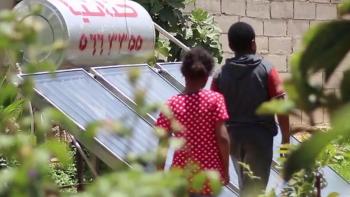Country Facts
- Capital city – Amman
- Population – 11.2 million
- Life expectancy – 75 years
- Unemployment rate – 22.6%
- Below poverty line – 24.1%
Find more country facts on: CIA The World Factbook –Jordan
Habitat Facts
•Habitat in Jordan started in 2002.
•Individuals served in FY2022 – 22,625
o Through new construction – 40
o Through incremental building – 19,965
o Through rehabs – 15
o Through repairs – 900
o Through market development – 955
o Through professional services – 750
•Volunteers engaged in FY2022 – 496
The housing need in Jordan
Located in the heart of a region riddled with political and economic conflict, the Hashemite Kingdom of Jordan has been a safe haven for people displaced by wars and unrest in neighboring countries. Approximately 1.3 million Syrian refugees live in the country.
According to the Jordan Response Plan 2020-2022, the presence of Syrian refugees and vulnerable Jordanians has raised demand for low-income housing, causing overcrowding and deteriorating infrastructure in urban areas such as East Amman. Jordan is also ranked third among countries that are suffering acute water shortage. National and local authorities are under pressure to provide basic services, especially as fuel, electricity, and water usages have risen sharply since 2011.
How Habitat addresses the need
Shelter rehabilitation
Through its shelter rehabilitation interventions, Habitat for Humanity supports both Syrian refugees and vulnerable Jordanian households. We prioritize vulnerable groups such as female-headed households, families with persons with disabilities and older adults. Rehabilitation works improve the living conditions of families, directly impacting their health, safety, security and general well-being. To strengthen broader social cohesion within the communities it serves, Habitat identified and rehabilitated essential community infrastructure in some neighborhoods and upgraded access to basic services and facilities in medical, community and child-care centers, as well as schools and public spaces.
Working with local community-based organizations
Habitat Jordan provides access to microloans that help low-income families to build, rehabilitate or repair their homes. We provide training and capacity-building services to community-based organizations in marginalized neighborhoods who, in turn, manage the loans and support families in their rehabilitation efforts.
Green, affordable housing
We implement green housing solutions that help ease the energy and water shortages in a country grappling with such issues. Application of green building designs, techniques and materials raises awareness of green, affordable housing, contributes to knowledge and skills of laborers and communities and empowers them to venture into new work opportunities.
Volunteer opportunities
Habitat Jordan welcomes volunteer groups from different parts of the world such as the U.S., Canada, United Kingdom and United Arab Emirates as they work alongside low-income families to build homes. We also foster a volunteering culture among Jordanian youth by working with local schools and encouraging students above the age of 16 to participate in builds and home rehabilitation works for low-income families
What you can do
DONATE
Please visit habitat.org/donate and select “Designate your donation” to donate to Habitat Jordan.
VOLUNTEER
The Global Village program is resuming region by region until a safe and quality experience can be provided at scale worldwide. The first batch of volunteers returned to Jordan in February 2022. Please visit habitat.org/gv for more information.
TITHE
Habitat affiliates in the U.S. support the international work through an annual tithe. For additional information, email [email protected] or contact your local Habitat organization
CONTACT
Email: [email protected]


